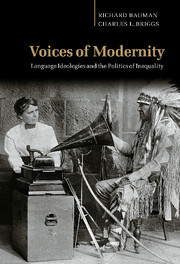Book contents
- Frontmatter
- Contents
- Preface
- 1 Introduction
- 2 Making language and making it safe for science and society: from Francis Bacon to John Locke
- 3 Creating modernity's others in seventeenth- and eighteenth-century England: antiquarian and philological inflections
- 4 The critical foundations of national epic and the rhetoric of authenticity: Hugh Blair and the Ossian controversy
- 5 Language, poetry, and Volk in eighteenth-century Germany: Johann Gottfried Herder's construction of tradition
- 6 Scientizing textual production in the service of the nation: the Brothers Grimm and Germanic philology
- 7 The making of an American textual tradition: Henry Rowe Schoolcraft's Indian researches
- 8 The foundation of all future researches: Franz Boas's cosmopolitan charter for anthropology
- 9 Conclusion
- References
- Index
Preface
Published online by Cambridge University Press: 22 September 2009
- Frontmatter
- Contents
- Preface
- 1 Introduction
- 2 Making language and making it safe for science and society: from Francis Bacon to John Locke
- 3 Creating modernity's others in seventeenth- and eighteenth-century England: antiquarian and philological inflections
- 4 The critical foundations of national epic and the rhetoric of authenticity: Hugh Blair and the Ossian controversy
- 5 Language, poetry, and Volk in eighteenth-century Germany: Johann Gottfried Herder's construction of tradition
- 6 Scientizing textual production in the service of the nation: the Brothers Grimm and Germanic philology
- 7 The making of an American textual tradition: Henry Rowe Schoolcraft's Indian researches
- 8 The foundation of all future researches: Franz Boas's cosmopolitan charter for anthropology
- 9 Conclusion
- References
- Index
Summary
Back some thirteen years and many life changes ago, we had an idea. Both of us had been thinking about questions of performance, how the enactment of discursive, bodily, and material forms in performative settings produces and transforms people and social relations. But we were unsatisfied with the ability of our own work and other frameworks with which we were familiar to capture the richness of events that we witnessed and the broad political, social, and historical questions that they raised. In particular, the way that friends George and Silvianita López, Francisco Pérez, or José Antonio Pérez used performances as political tools in challenging racism and nation-states seemed to be much more sophisticated than any framework we could muster in accounting for it. Sharing discomfort with received categories of language, aesthetics, culture, tradition, and other truths that generally seemed to be held to be self-evident, we had the vague feeling that some sort of magic act had been performed long before our time that transformed certain problematic categories into supposedly universal features of the world around us. While we saw our scholarly work as part of a progressive political project, we were not satisfied with our efforts to tie theorizing and analysis to struggles to challenge social inequality and structures of oppression.
At first we agreed to organize a conference.
- Type
- Chapter
- Information
- Voices of ModernityLanguage Ideologies and the Politics of Inequality, pp. viii - xviPublisher: Cambridge University PressPrint publication year: 2003

